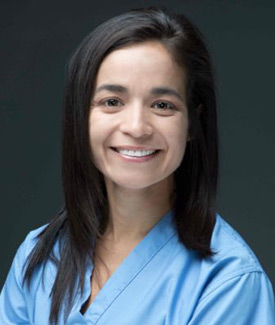Expanding medical literature access in Peru
20th Anniversary of Global Health Fellows and Scholars

Dr. Roxanna Garcia didn’t have in her mind a clear path into neurosurgery. As a first-generation medical school applicant, she says, "I was skeptical that I would even be accepted into medical school, let alone become a surgeon, and especially a neurosurgeon."
For those unfamiliar with how long it takes to become a neurosurgeon in the United States, it is a 15-year track at a minimum. This is likely the reason why there are only 4,000 or so practicing neurosurgeons in the country today. Garcia was entering her sixth year of training when she applied to the Fogarty Fellows and Scholars program, now known as LAUNCH.
Her love for public health drove her initial interest in medical school, and she originally planned to work in infectious disease or as an epidemiologist. Her ideas changed after her undergraduate and preclinical years and after she obtained degrees in public health and medicine through the UC Berkeley-UCSF Joint Medical Program. Along the way, she'd also spent some time in Mexico doing infectious disease work related to Chagas disease. "It hit me while I was performing my clinical duties that the day-to-day infectious disease work was not for me. While it was interesting intellectually, I was also drawn toward a different medical discipline—neurosurgery: there was something very intense and unique about it." Understanding this, she transitioned to a career that merges her interests in public health and surgery. "I feel incredibly fortunate to have found this path."
Garcia's Fogarty project aimed to describe the current health care system in Peru and its level of preparedness to provide essential and primary neurosurgical care. She and her team identified target areas for further research projects and interventions that would strengthen the surgical ecosystem within Peru.
Her research team found that there were often delays in accessing the country's basic and essential primary care, let alone higher-level services and surgical care. Everyone in the Peruvian system receives an identification number, similar to the Social Security in the United States. However, not all the hospitals are connected digitally, which causes discrepancies in tracking and follow-up for patients. Many hospitals her team studied, even in very populated cities, lacked the tools, workforce, and institutional support needed to perform a basic craniotomy, a potentially life-saving procedure for patients suffering from subdural hematomas. This condition, when blood collects between the covering of the brain (dura) and the surface of the brain, occurs in up to 25% of patients suffering a brain injury, and can be deadly if not treated quickly.
Ultimately her team recommended that the literature on neurosurgery access needs be expanded to explain the disparities in access to neurosurgical care in lower resource settings and to prevent publication bias—the selective publication of research studies based on their results, where studies with positive outcome are favored over those with negative outcomes.
Today, Garcia serves as an assistant professor of neurological surgery at Northwestern University's Feinberg School of Medicine with about six more years before officially becoming a board-certified neurosurgeon. She sits on several international neurosurgical committees, including the World Federation for Neurosurgical Societies. Founded in 1955, it is one of the oldest and largest international neurosurgery organizations. As a part of this global group, she is one of 10 neurosurgeons who work to strategize targets for improving neurosurgical care in collaboration with WHO partners.
Locally, she mentors surgeons and medical students at her institution who are interested in global surgery. She is also working with domestic organizations and the Northwestern University Clinical and Translational Sciences Institute to help develop an academic neurosurgical program that is global in nature and advances healthcare both domestically and internationally for neurosurgical patients.
She advises future trainees, especially those interested in neurosurgery, to "embrace the challenges in your personal and academic life. No one is immune, but if you stay positive and continue to network and connect with mentors, it can change your life."
More Information
Updated December 13, 2023
To view Adobe PDF files,
download current, free accessible plug-ins from Adobe's website.
Related Fogarty Programs
Related World Regions / Countries
Related Global Health Research Topics